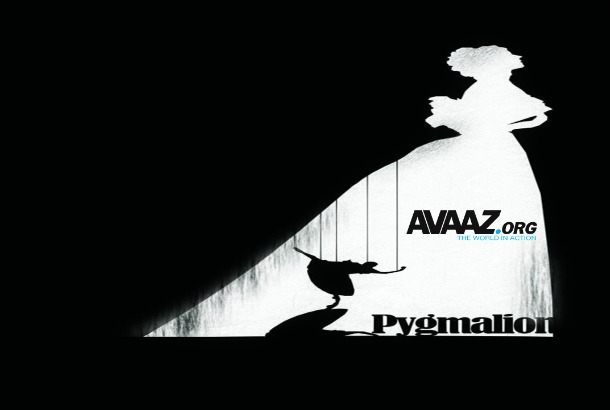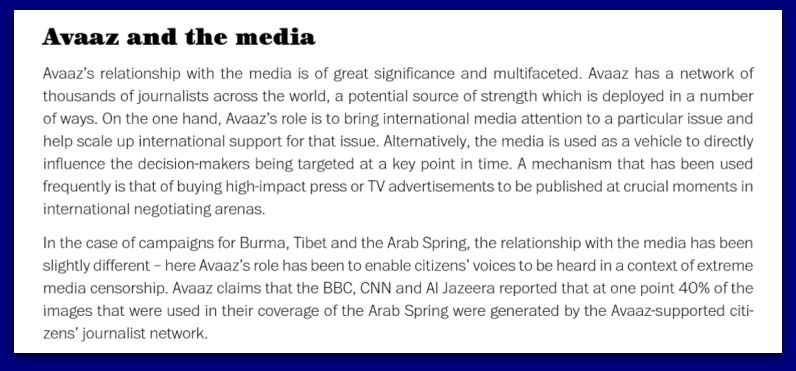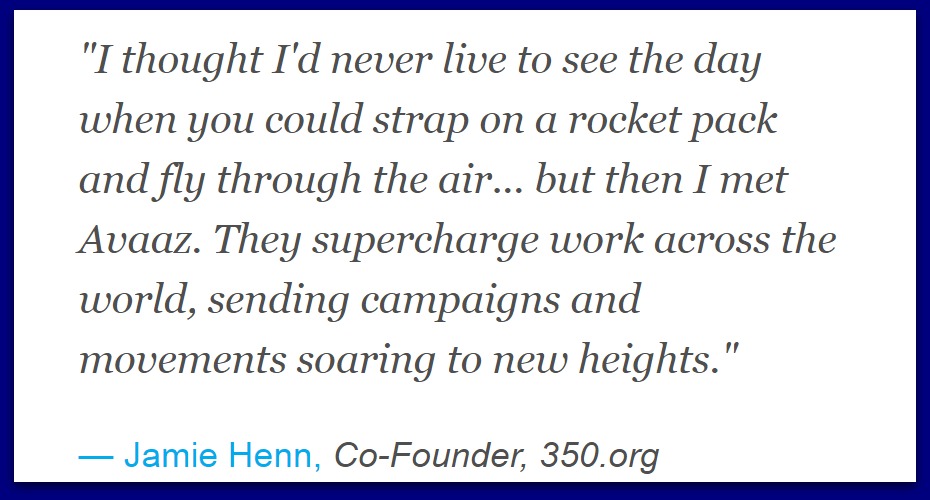Cory Morningstar & Forrest Palmer
Wrong Kind of Green
ACT ONE
In Greek mythology, Pygmalion was a sculptor who carved a statue of a beautiful woman out of ivory. A statue so beautiful, that Pygmalion fell in love with it. The symbolism in the play by George Bernard Shaw is premised on Henry Higgins falling in love with his own creation.

Rex Harrison & Audrey Hepburn in “My Fair Lady” 1964. (Photo: Screenshot)
According to The B Team report, Keith Tuffley manages the day-to-day operations of The B Team.
In his LinkedIn profile Tuffley states he is “Managing Partner & CEO of The B Team, a not-for-profit initiative headquartered in New York.” (Here, we must again recall that the headquarters as spoken of by B Team affiliates is that of the PR firm Purpose.) He is the former Managing Director and Head of Investment Banking at Goldman Sachs in Australia with over 25 years experience in investment banking, finance, and capital markets. Tuffley is founder & chairman of NEUW Ventures, an impact investing company based in Switzerland. He also serves as Director or Governor on various NGOs including WWF-Australia.
Tuffley is a member of the Corporate Advisory Panel of the World Forum for Natural Capital[Full bio] and is identified as belonging to the “wider project team” of co-founders Polman and Malloch’s Business and Sustainable Development Commission. [Source: BETTER BUSINESS BETTER WORLD, the report authored by the Business & Sustainable Development Commission, January 16, 2017]
The B Team executive committee [1] is comprised of the executive chair (Jochen Zeitz), three senior partners (Jean Oelwang, Joanna Rees and Keith Tuffley) and Managing Director Rajiv Joshi, who “oversees the organisation’s strategy”.
Where White Polar Bears Meet White Helmets
“Ultimately, this is a cultural challenge—linked to our own culture and to wider cultural dynamics. In the good old days, we saw NGOs as leading indicators of change, but today it’s the Millennials, whatever NGOs or networks they may belong to.” — The Stretch Agenda, Breakthrough in the Boardroom [Source]
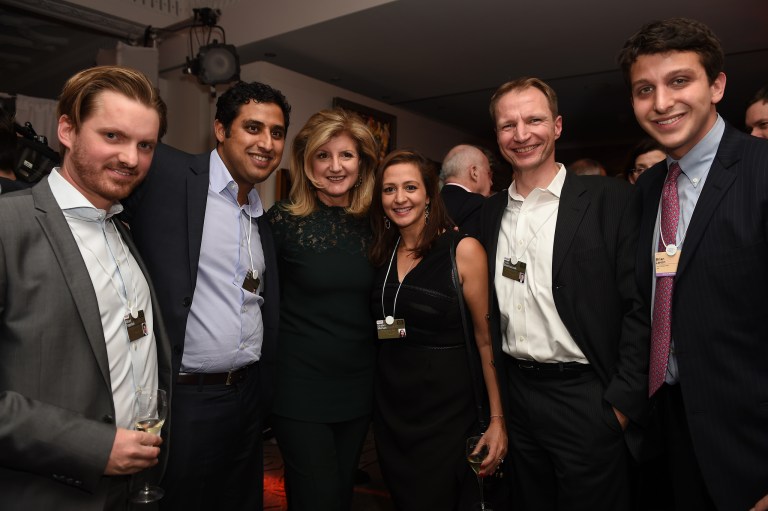
“Mikael Fraenkel, Rajiv Joshi, Arianna Huffington, Shalini Mehan, Felix Stellmaszek during DLD15 FOCUS Nightcap at Steigenberger Grandhotel Belvédère in Davos on January 21, 2015.” Foto: Hubert Burda Media / BRAUER PHOTOS. Flickr
From the aforementioned Better Business Better World report:
“Rajiv Joshi is a Managing Director and has been with the organisation since its inception. He previously served as Executive Director for the Global Call to Action Against Poverty. Joshi served six years as a Trustee of Oxfam and as a Board Member of CIVICUS. He is currently on the Board of the Centre for Scottish Public Policy, and has served on the Equality and Human Rights Commission and as chair of the Scottish Youth Parliament.”
Joshi has an extensive background pushing forward both the UN Millennium Development Goals and the Sustainable Development Goals (SDGs/”Global Goals”). He has been groomed by the United Nations, Skoll (2017 Skoll Awardees Convening, 2017 Skoll World Forum) and Branson. From the Skoll website:
“During this time he led global action towards the achievement of the Millennium Development Goals (MDGs), mobilizing over 173 million people as part of the ‘Stand Up: Take Action’ initiative. He also supported ‘The Elders’ with their Every Human Has Rights campaign and helped spearhead citizen participation in creating the Sustainable Development Goals (SDGs), as co-founder of ‘The World We Want 2015’ platform and founding Chair of the Post-2015 Policy and Strategy Group.”
Let this section serve as an introduction to where 21st century environmentalism (which today is, in reality, anthropocentrism) meets the 21st humanitarian industrial complex. [Further reading: The Humanitarian Industrial Complex School of Thought | A Fish Analogy] Where white polar bears (the emotive veneer for economic growth, land and resource theft, privatization, the financialization of nature) meet white helmets (the emotive veneer for economic growth, land and resource theft, privatization, war).
This is the intersection where today’s anointed “thought leaders” cut their teeth.Akin to the Central London Hatchery and Conditioning Centre in Aldous Huxley’s Brave New World, today’s so-called environmental leaders and human rights activists are not (yet) genetically engineered, rather they are socially engineered experiments decanted from Harvard, Yale, Rockwood Leadership Institute and other institutions of indoctrination that serve and expand the global hegemony.
One could theorize that today’s 21st century activism is a new process of mimesis – the millennial having assimilated into spectacle – far removed from both nature and reality.
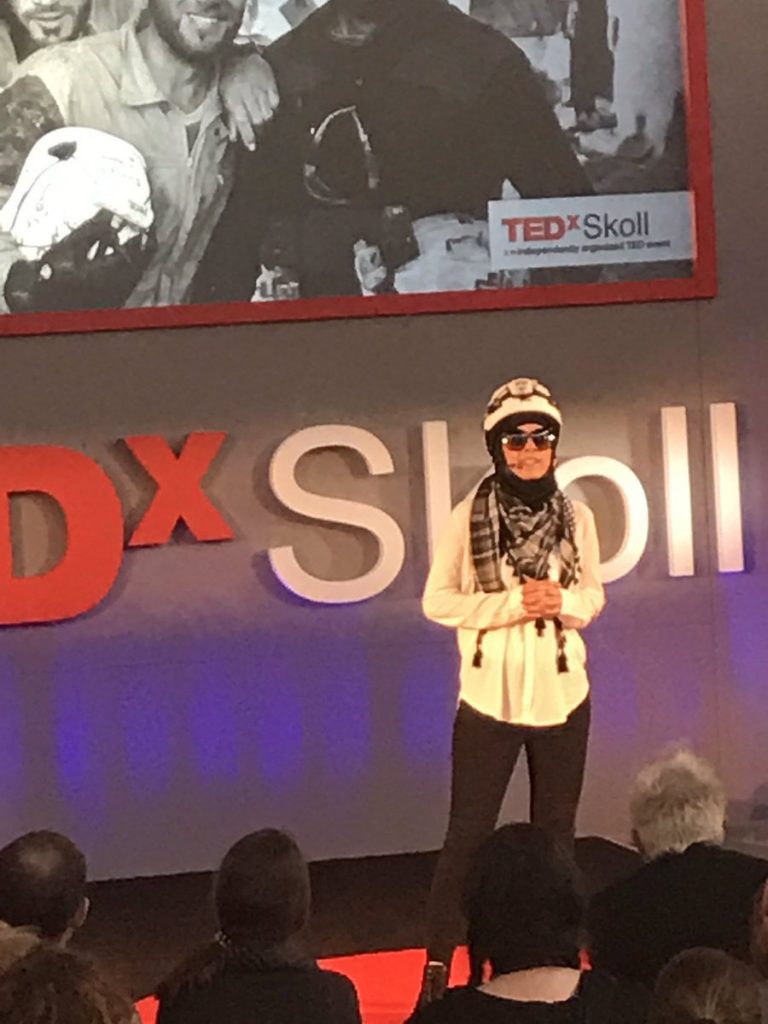
TEDxSkoll on Twitter: #TEDxSkoll TALK: ‘White Helmets @SyriaCivilDef: The Power of Trained Volunteers’”[Source]
Indicative of the accolades and tutelage showered down upon the aforementioned millennial Joshi, today’s thought-leaders are groomed, molded, and managed – specifically to manufacture and mobilise/engineer world views as desired and designed by the world’s most powerful hegemons. Ego, celebrity fetish, access, wealth, luxury are all Western desires that are fostered and cultivated in today’s assembly-line “activists”.
Together, these desires, when nurtured, are an opiate that lures, beguiles and hooks the freshly-engineered plastic “activists” that today flourish like cells within the walls of non-profit industrial complex. The complex is the vehicle for the continued expansion of capital markets (infinite growth) and the protection of existing power structures.
Today we witness the world’s richest 300 people having more monetary wealth than the bottom 3 billion people. The same ruling elite invest trillions into the NPIC to ensure this existing power structure not only stays firmly intact, but expands. This is not “philanthropy”, a word created by and utilized by the rich to make theft of labour and commons not just acceptable, but illustrious. Rather, this is the best investment money can buy.
The aforementioned Stand Up and Take Action is an annual global mobilization coordinated by the United Nations Millennium Campaign and the Global Call to Action against Poverty. In addition, the Elders is another Richard Branson NGO, a person who has his tentacles wrapped around an innumerable amount of NGO endeavors owned and sanctioned by the global elite. “The World We Want” is a United Nations SDG campaign.
“Most funding and direction come from the wealthy nations. Often the donors form a conglomerate creating mutual responsibility and considerable ambiguity. CIVICUS, a partnership to promote “civil society” worldwide, is funded by, among others, American Express Foundation, Bristol-Myers Squibb Foundation, Carnegie Corporation, Canadian International Development Agency, Ford Foundation, Harvard University, Oxfam, and United Nations Development Programme.” — Joan Roelofs [Source]
As the grooming is underscored by the collaboration of mentors and mentees in private and public endeavors, it is of course no surprise to find Rajiv Joshi in the company of Avaaz/Purpose co-founder Jeremy Heimens in a We Mean Business video series (since We Mean Business is an NGO founded by The B Team registered to Heiman’s Purpose). However, the following excerpt from the book The Myth Gap: What Happens When Evidence and Arguments Aren’t Enough demonstrates the unity and alliances of multifarious NGOs that prosper in a highly centralised manner outside of the public spectrum (see excerpt below).
Public perception is critical for the brand.
Thus, NGOs that serve on the forefront of the manufactured movements make a concerted effort to not publicly align with NGOs openly chasing capital and economic growth. The reality is this: the cherry-picked and highly groomed “leaders” of the world’s most influential NGOs, the ones with the faux radical veneer such as 350.org, Avaaz and Greenpeace, run in the same circles as the openly capitalist NGO models such as the B Team – which run/operate in the same circles as the International Crisis Group. NGOs that publicly promote and accelerate market-based solutions that will only further perpetuate our multiple ecological crises. NGOs that perpetuate the myth of “humanitarian interventions” and spontaneous popular revolutions.
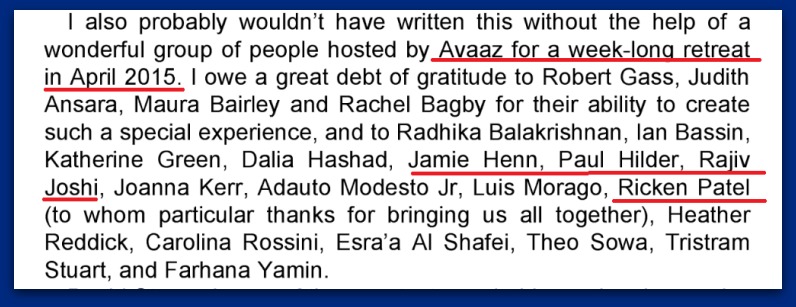
Above: Screenshot from The Myth Gap: What Happens When Evidence and Arguments Aren’t Enough By Alex Evans
Here we witness the social-organizational psychology experts grooming tomorrows “new champions“, “global shapers” and “new power” “thought-leaders” as determined and ultimately dictated by the world’s most powerful elites. In the 21stcentury, psychology is not only an extremely important tool in influencing public opinion, it is now considered to be perhaps the single and most important tool. The necessity to comprehend the mental processes, desires and social patterns of the populace at large cannot be understated. Working in lock-step with controlled media and the best marketing executives foundation money can buy, today’s faux activists, thought-leaders and media lapdogs are the very mechanisms of modern-day perception.
Consider the following claim by Avaaz that “BBC, CNN and Al Jazeera reported that at one point 40% of the images that were used in their coverage of the Arab Spring were generated by the Avaaz-supported citizens’ journalist network”. (See below screenshot.)
If this claim is verifiable, it is indisputable truth that the establishment is able to use its resources to maneuver, influence and control untold portions of protests. Thus, it is critical to question what is a legitimate protest versus what is a protest orchestrated by outside influences.
“We’ve trained them. That translates into diplomatic leverage.”— Supremacy by Stealth, Robert Kaplan
As an example of the opacity prevalent in these various movements, the race to implement the financialization of nature (payments for ecosystem services) under the guise of UN’s “Global Goals” is nothing less than frenetic. Yet for all of the ongoing activity, this corporate triumph is being conducted in the background, with zero dissent, due to the fact that at the forefront of the manufactured movements – there is complete silence. Zero opposition. The non-profit industrial complex being the wall that protects and insulates the coup d’état of nature itself.
“Surveying this new landscape, it is clear that the true role of the thought leader is to serve as the organic intellectual of the one percent—the figure who, as Gramsci put it, gives the emerging class “an awareness of its own function” in society. The purpose of the thought leader is to mirror, systematize, and popularize the delusions of the superrich: that they have earned their fortunes on merit, that social protections need to be further eviscerated to make everyone more flexible for “the future,” and that local attachments and alternative ways of living should be replaced by an aspirational consumerism.” — The Rise of the Thought Leader – How the superrich have funded a new class of intellectual, June 28, 2017
Establishing New Norms: Future Stewards, Pathfinders and Deep Practitioners
Perhaps there is no better snapshot of the congregation of all this grooming of the next generation of NGO leaders than the 2015 Avaaz retreat. This retreat finds The B Teams Joshi in the company of his peers and “movement builders”. Those identified in the aforementioned book excerpt are as follows:
Robert Gass: co-founder of the Rockwood Leadership Institute, former President of ARC International, a global consulting and training company specializing in transformational change with Fortune 500 companies. Robert has a doctorate in Clinical Psychology and Organizational Development from Harvard University. [2]
Judith Ansara: A former facilitator for the Rockwood Leadership Institute’s The Art of Leadership trainings, she has facilitated organizations and leaders Avaaz, Witness and UNICEF. She has taught Transpersonal Psychology at Naropa University and Strategic Communications at the University of Massachusetts. [3]
Maura Bairley: Leads the Organizational Development Team for Move to End Violence, a project of the NoVo Foundation. [4]
Rachel Bagby: A Stanford Law Degree in Social Change and leadership consultant whose clients include leaders from organizations such as Google, the Sierra Club and Rockwood Institute. [Source]
Radhika Balakrishnan: Faculty director of the Center for Women’s Global Leadership at Rutgers University. Past experience includes working for the Ford Foundation as a program officer in the Asian Regional Program.
Ian Bassin: Former Associate Counsel to President Obama, General Counsel and Campaign Director at Avaaz, Current director of United to Protect Democracy [“United to Protect Democracy, which draws its name from a line in President Barack Obama’s farewell address that urged his supporters to pick up where he was leaving off…] Signatory to the Economic Security Project. [5]
Dalia Hashad: Attorney and a campaign director at the global advocacy group Avaaz.org. Prior to Avaaz Hashad worked for Amnesty International UK (Director, USA Program) and ACLU American Civil Liberties Union.
Jamie Henn: 350.org co-founder, Strategy and Communications Director:
“I thought I’d never live to see the day when you could strap on a rocket pack and fly through the air… but then I met Avaaz. They supercharge work across the world, sending campaigns and movements soaring to new heights.” — Jamie Henn, co-founder, 350.org, Avaaz website
Paul Hilder: Avaaz co-founder Paul Hilder is the former Vice President of Global Campaigns for Change.org, a for-profit social venture started in 2006. He is co-founder and Chief International Officer of Crowdpac, “the platform for new politics”. He cofounded 38 Degrees and openDemocracy.net. He played leadership roles at Oxfam, Purpose, Here Now (Purpose) and the Young Foundation. His background in the NPIC and the Middle East is extensive. [6]
Joanna Kerr: Executive Director of Greenpeace Canada. Former Chief Executive of ActionAid International, Policy Director at Oxfam Canada. [7]
Adauto Modesto Junior: Brazil Student Ambassador, Lemann Fellow, at David Rockefeller Center for Latin America Studies, Brazil (Harvard). Served on the Civil Cabinet of the Presidency of the Republic and the Ministry of Finance in Brazil. [Source]
Luis Morago: Campaign Director at Avaaz (Spain). Former head of Oxfam International’s EU Office (2007: “EU institutions are in a unique position to promote the R2P principle and give leadership,” Source] Previously worked on “the concept of rights-based approach in an emergency context” with British Red Cross Society and ActionAid (Research and Programme Learning Officer). [Source]
Heather Reddick: Avaaz Chief Operating Officer, Avaaz. Former Director of Finance & Administration at Let’s Get Ready, International Operations Director at Students for a Free Tibet, and National Operations Director at League of Young Voters. (Avaaz salary in 2014: USD$148,323.00 & USD$5,736.00 misc. expenses)
Carolina Rossini: Coordinates the Brazilian Open Educational Resources Project: Challenges and Perspectives funded by the Open Society institute. [Source] [Source]
Esra’a Al-Shafei: Bahraini civil rights activist, founder and executive director of Mideast Youth and its related projects, including FreeKareem.org and CrowdVoice.org. Featured at the 2009 Clinton Global Initiative University. Featured in Forbes’ 2014 “30 Under 30” list of social entrepreneurs making an impact in the world. Listed by the World Economic Forum as one of “15 Women Changing the World in 2015.”[8]
Theo Sowa: An independent advisor and consultant, specialising in international social development. An international consultant for NGOs such as as UNICEF, The Stephen Lewis Foundation, The African Union, Department for International Development, and UNDP. Awarded the Commander of the Order of the British Empire (CBE) in June 2010. [Source]
Tristram Stuart: English author and campaigner.
Farhana Yamin: International lawyer specializing in global climate change law and policy. Founder and CEO of Track 0, Associate Fellow at Chatham House, Visiting Professor at University College London. [Source]
For further proof of strategic and highly organized grooming, consider the We Mean Business, Leaders’ Quest and Mission 2020 (under the direction of The B Teams Christiana Figueres) document Future Stewards – The Case for Partnership and Investment 2016-2020. The document outlines the desired behavioural change strategy to implement the “new economy”. The term “Deep Practitioners” is applied to a cohort of “30 senior leaders of influential private, public and civil society organizations, who are willing to collaborate across sectors and change their own patterns of behavior.”
The budget thus far to train “future stewards” is 10 million. In the sample list of participants from the document outlining the “Pathfinders and Deep Practitioners Programs from 2017, we find recognizable names such as Jamie Henn, Strategy and Communications Director, 350.org, former co-director of Greenpeace International’s Global Climate and Energy Program and corporate pet Tzeporah Berman, Grant Advisor, New Venture Fund and Rajiv Joshi, Managing Director of The B Team.
As the machine works to churn out the next generation of leaders more beholden to the system than their predecessors yet with better and increased obfuscation, the following quote from the document best summarizes the goals and aspirations of gatherings such as the Avaaz retreats:
“Global Influencers will create public and private opportunities for influential leaders to join the collective movement. Committed leaders will increase pressure on their peers to engage – establishing a new norm.”
Here, in these circles, there is no conscious belief in American imperialism, but only American “exceptionalism”, a description that is beyond debate and unquestionable in mainstream circles. Trees, whales and bees no longer exist except as a means of achieving sought metrics. All/any remaining anti-war sentiment having been replaced with the pathological cheerleading of “coloured revolutions”, exporting “American democracy” and “greening” the military.
The NPIC is the vehicle of “transformational change” which can only be honestly described as that which is designed, sought and financed by the world’s most powerful elite. The ideologies underpinning the dream of “ethical globalization” (a term utilized by the group Res Publica), a globalized “deliberative democracy” has been the said driving force of Avaaz co-founders since their founding of Res Publica. Here, in these circles is where the myth of American exceptionalism is perpetuated. This faux belief, is the tie that binds. Here, in these circles, the power of conformity takes hold.
Nowhere is the role of Avaaz more apparent in the advancement of the Nations Sustainable Development Goals (the financialization of nature, global in scale) than in the following paragraph written by Patel in 2014:
“The vision put forward by the UN High-Level Panel on the Post- 2015 Development Agenda is a beautiful one, and one I believe the vast majority of people share. But now comes the hard part: getting our governments to get behind this plan, first rhetorically, and then with actual budgets and political will. And to stay behind it until the job is done.
To make that happen, we need one of the largest, most comprehensive and sustained political campaigns the world has ever seen. One that captures public imagination like never before. It won’t be a single campaign or coalition that does this, but a vibrant network of governments, NGOs, businesses and individuals that come together around this shared vision and coalesce into fit-for-purpose groups as needed, to seize opportunities and meet threats.
These groups will need to use every tactic in the book, because that’s what entrenched interests who oppose progress will be doing. The threads that tie all this together likely won’t be a single brand, but memes and narratives that define and embody the zeitgeist. One popular meme, often offered tongue-in-check, is the idea of saving the world. It’s a narrative deep in our psyche, the theme of many of our most popular epics. But if ever there were a time to use this meme and its power in all seriousness, it’s now. It’s time for a movement to save the world.” — p. 17, Ricken Patel, Global Development Goals, Partnerships for Progress, 2014
***
For more information on AVAAZ: 21st Century Wire AVAAZ files
SUPPORT 21WIRE – SUBSCRIBE & BECOME A MEMBER @ 21WIRE.TV



